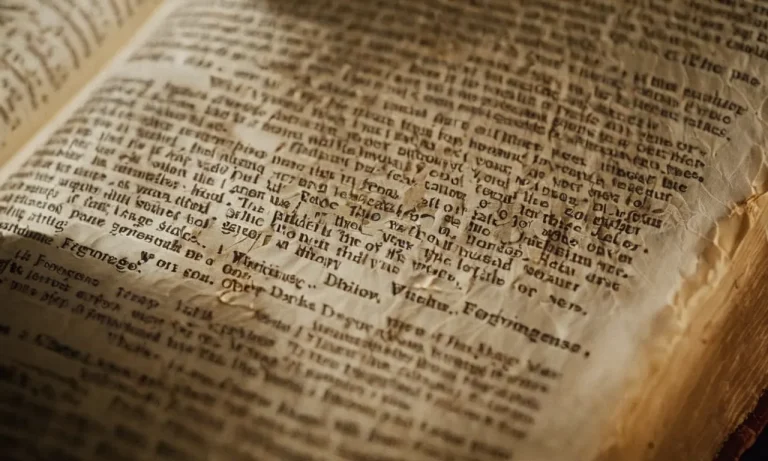What Did God Promise The Israelites?
The story of the Israelites and their covenant with God is central to Judeo-Christian history. For centuries, the Israelites endured slavery in Egypt before God called on Moses to lead them to freedom. This began a tumultuous journey that led them to Canaan, the land God had promised them.
If you’re short on time, here’s a quick answer: God made a covenant with Abraham promising his descendants the land of Canaan. He later delivered the Israelites from slavery in Egypt and promised to make them His chosen people if they kept His laws and commandments.
In this approximately 3000 word article, we will explore the history of God’s promises to the Israelites in depth. We will analyze major biblical events and themes to understand exactly what God pledged to the Israelites and what He expected in return.
God’s Initial Covenant and Promise to Abraham
The Call of Abram and the Covenant
God first established his covenant with Abram (later renamed Abraham) in Genesis 12, when He called Abram to leave his country and kindred and go to the land that God would show him. God told Abram that He would make of him a great nation, bless him, make his name great, and make him a blessing to others.
Abram obeyed God’s call, and God later reiterated His promise to give Abram’s descendants the land of Canaan.
This unconditional covenant was a formal agreement between God and Abram, sealed with sacrifice in Genesis 15. God promised to give Abram an heir and make his descendants as numerous as the stars. He foretold their sojourn in Egypt and return to inherit the promised land.
That night, the Lord made His covenant with Abram through an awe-inspiring torch-lit ceremony. According to Biblica, these covenant ceremonies were a familiar cultural custom, but God’s covenant with Abraham was unique because it was unilateral and everlasting.
The Promise of Land and Descendants
A key aspect of God’s covenant with Abraham was the promise of land and descendants. Though Abram had no children when God first called him, God pledged to give Abram so many descendants they would become a great nation (Genesis 12:2). This promise was phenomenal considering Sarai was barren.
But God miraculously enabled her to bear Isaac in old age, fulfilling His word.
God also promised Abram that his offspring would inherit Canaan, the Promised Land (Genesis 12:7). This area encompassed modern-day Israel and Palestine. Hundreds of years later, under Joshua’s leadership, the 12 tribes of Israel finally took possession of Canaan.
But God’s land promise extended far beyond Abram’s lifetime. As GotQuestions.org notes, Israel has not yet inhabited the full boundaries God pledged. The inheritance of these lands awaits the Kingdom age.
Though partial fulfillment came, the ultimate fulfillment of God’s land and people promises to Abram awaits the future. But a key part of the Abrahamic covenant was God pledging blessings to all nations through Abram (Genesis 12:3).
This was a prophetic reference to Jesus Christ extending salvation globally.
Moses, the Burning Bush, and God’s Promise to Rescue the Israelites
400 Years of Slavery in Egypt
The Israelites, descendants of Jacob, had been living in Egypt for over 4 centuries after Joseph brought his family there during a famine. Over time, the Egyptians began to fear the growing number of Israelites and decided to enslave them (Exodus 1:8-14).
The Israelites suffered greatly under this intense physical labor and oppression.
God Hears the Cry of the Israelites
After 400 years of slavery, the bible says that the Israelites cried out to God for rescue (Exodus 2:23-25). God heard their painful cries and was concerned about their suffering. He made a promise to Moses that He would deliver the Israelites out of Egypt into the Promised Land.
The Call of Moses and the Promise of Deliverance
God appeared to Moses in the burning bush and told him he had been chosen to lead the Israelites out of Egypt (Exodus 3:1-10). God promised Moses that He would be with him (Exodus 3:11-12) and that Pharaoh would eventually let the Israelites go (Exodus 3:18-20).
Specifically, God pledged to Moses that He would:
- Bring the Israelites out of Egypt into the Promised Land (Exodus 3:8)
- Strike Egypt with wonders that would compel Pharaoh’s hand (Exodus 3:20)
- See that the Israelites left Egypt with rich plunder (Exodus 3:21-22)
God kept these promises by unleashing 10 plagues on Egypt, decimating them into finally letting His people go after the death of every firstborn son during Passover (Exodus 12:29-32). He then parted the Red Sea to provide the Israelites safe passage out of Egypt (Exodus 14:21-22), drowned Pharaoh’s armies when they pursued the fleeing slaves (Exodus 14:26-28), and guided the Israelites towards Canaan through pillars of cloud and fire (Exodus 13:21-22).
| Promise | Fulfillment |
|---|---|
| Bring Israelites out of Egypt | Parting of the Red Sea (Exodus 14:21-22) |
| Strike Egypt with plagues | 10 devastating plagues (Exodus 7-12) |
| Israelites leave with rich plunder | Plundered gold, silver, and clothing (Exodus 12:35-36) |
Clearly, God kept every promise to redeem His people from slavery in Egypt, paving the way for them to enter Canaan and establish themselves as a great nation dedicated to Him. Though the journey was long and arduous, God provided for every step.
As Numbers 23:19 declares, “God is not a man, that He should lie.”
The Ten Plagues and Exodus: God Keeps His Promise
Nine Plagues Afflict Egypt
After Moses demanded that Pharaoh let the Israelites go, God unleashed nine fearsome plagues upon Egypt to compel Pharaoh to free His people. Water turned to blood, frogs overran the land, gnats and flies swarmed, livestock died, boils broke out on man and beast, hail and fire destroyed crops, locusts devoured vegetation, and darkness covered the land for three days (Exodus 7-10).
Yet Pharaoh’s heart remained hardened after each plague. Though these escalating disasters caused immense suffering and chaos in Egypt, Pharaoh refused to keep his word and let the Israelites leave.
The Tenth Plague and the First Passover
As the final devastating plague, God warned Pharaoh He would kill every firstborn son in Egypt. He instructed Moses to tell the Israelites to sacrifice unblemished male lambs and mark their doorposts with the blood so the Lord would “pass over” their homes when executing judgment on the Egyptians (Exodus 11-12).
On the night of the first Passover, after the angel of death killed the firstborn sons of Egypt, a loud wailing was heard. But God kept His promise and passed over the homes marked with lamb’s blood, sparing the Israelite firstborns.
Finally, Pharaoh summoned Moses and Aaron, urging them to take their people and herds and leave Egypt. After 430 years of captivity, the exodus of the Israelites from Egypt was starting.
The Exodus and Parting of the Red Sea
The Israelites eagerly left Egypt. But after they camped near the Red Sea, Pharaoh changed his mind and mobilized his army to reclaim his Israelite labor force. With soldiers racing toward them, the frightened Israelites cried out to Moses in panic (Exodus 14).
But God told Moses, “Stand firm and you will see the deliverance the Lord will bring you today…The Egyptians you see today you will never see again. “
Then the Angel of God and the pillar of cloud moved behind the Israelites, separating them from the Egyptian army. God told Moses to raise his staff over the sea and parted the waters overnight with a strong east wind! The Israelites walked through on dry ground with walls of water on each side.
However, when the Egyptians raced after them into the sea bottom, God caused their chariot wheels to come off, making them panic. At daybreak, God told Moses to stretch out his hand over the sea. The waters returned, drowning the entire Egyptian army.
By parting the Red Sea to bring His people to safety, God kept His covenant promise to Abraham to rescue his descendants from slavery. Through these awesome miracles, God revealed His power over both nature and nations.
The exodus demonstrated God’s faithfulness to the Israelites and His incomparable glory and dominion over all Creation.
The Covenant at Mount Sinai: God’s Expectations
Moses Receives the Ten Commandments
After the Israelites were freed from slavery in Egypt, God led them to Mount Sinai. There, God made a covenant with the Israelites and gave them the Ten Commandments. These laws and rules were part of God’s expectations for how the Israelites should live.
According to the Bible, God instructed Moses to climb Mount Sinai, where He spoke to Moses and gave him two stone tablets engraved with the Ten Commandments (Exodus 19-20). The Ten Commandments provided guidance to the Israelites on how to treat God and each other.
For instance, the first few commandments focused on the Israelites having no other god before Yahweh, not misusing God’s name, and honoring the Sabbath day. The later commandments included instructions on honoring parents, not committing murder or adultery, and not stealing or bearing false witness.
The Israelites Accept the Covenant
After descending Mount Sinai with the stone tablets, Moses presented the Ten Commandments to the Israelites. They accepted God’s covenant and agreed to follow His laws and rules. Exodus 24:3 states “When Moses went and told the people all the Lord’s words and laws, they responded with one voice, ‘Everything the Lord has said we will do.'”
This agreement between God and the Israelites established expectations on both sides. God expected the Israelites to follow His decrees, while the Israelites could expect God’s protection and favor as long as they upheld their obligation.
The covenant was a sacred promise that defined the relationship between God and His chosen people.
Blessings for Obedience and Curses for Disobedience
As part of the covenant at Mount Sinai, God promised blessings and prosperity to the Israelites if they faithfully obeyed Him. He would bless them with seasonal rains, productive harvests, healthy livestock, and victory over enemies (Deuteronomy 28:1-14).
However, God also warned of consequences if the Israelites disobeyed. Curses such as famine, disease, and military defeat would come upon them as punishment (Deuteronomy 28:15-68). These blessings and curses established incentives and accountability for the Israelites to keep their covenant promise to God.
Throughout the Old Testament, the Israelites’ obedience and disobedience resulted in blessings and curses that affirmed God’s authority and control over their destiny.
The Next Generation and Entrance into Canaan
Forty Years in the Wilderness
After the Israelites’ refusal to enter Canaan due to lack of faith, God sentenced them to wander in the wilderness for 40 years until the entire unbelieving generation had passed away, with the exception of Joshua and Caleb who trusted God (Numbers 14:26-35).
This served as a period of discipline and preparation for the next generation to finally inherit the land.
Moses continued leading the Israelites towards Canaan during this interim period. They engaged in various battles against Canaanites and Amalekites, dealing with rebellions, episodes of grumbling, as well as receiving ongoing instructions and provisions from God.
By the 40th year, the entire first generation had died out in the wilderness as God had declared (Deuteronomy 2:14-16).
Joshua Succeeds Moses and Leads the Conquest
With the 40 years over and old generation dead, God commissioned Joshua to succeed Moses and lead this new generation of Israelites to go in to take possession of Canaan’s land (Deuteronomy 31:7-8, 34:9; Joshua 1:1-9).
Joshua was one of the 12 spies originally sent by Moses 40 years earlier who trusted in God’s promise (Numbers 14:6-9). He, along with Caleb, survived the wilderness years and were now equipped to guide Israel towards claiming their long-awaited inheritance.
Joshua proceeded with military campaigns attacking Canaanite cities and lands. Great victories were achieved through God’s power at places like Jericho and Ai (Joshua 6 and 8). Joshua allotted portions of conquered lands to various tribes of Israel as their inheritance according to God’s instructions (Joshua 13-22).
After Joshua’s lifetime, the Israelites continued battling Canaanites and taking more territory under subsequent leaders like Othniel and Deborah (Judges 1-3).
The Inheritance of the Promised Land
Although much progress was made conquering Canaan under Joshua’s leadership, the process of completely inheriting the land as originally promised took longer than a single lifetime to accomplish. As seen in the book of Judges, Israel struggled with falling into idolatry and sin which allowed enemies to oppress them for years before God raised up deliverers to lead the people back to faith and freedom.
By King David’s rule, the majority of Canaan’s territory was under Israelite control (2 Samuel 8). His son Solomon eventually ruled a vast kingdom encompassing much of the land bridge between Egypt and Mesopotamia (1 Kings 4:21).
Though parts of this land were lost in following centuries, the descendants of Abraham inherited most of the borders defined to them by God in His covenant promises (Genesis 15:18–21). This serves as a picture of the eternal Promised Land awaiting all God’s people (Hebrews 11:8–16).
Conclusion
For Abraham and his descendants, God made a revolutionary promise to make them His own treasured people. After centuries of slavery, He miraculously delivered the Israelites to freedom. Yet the path was not easy.
Due to disobedience, an entire generation wandered the wilderness before their descendants claimed Canaan. Still today, the promises to the patriarchs sustain hope of inheritance for the children of Israel.








